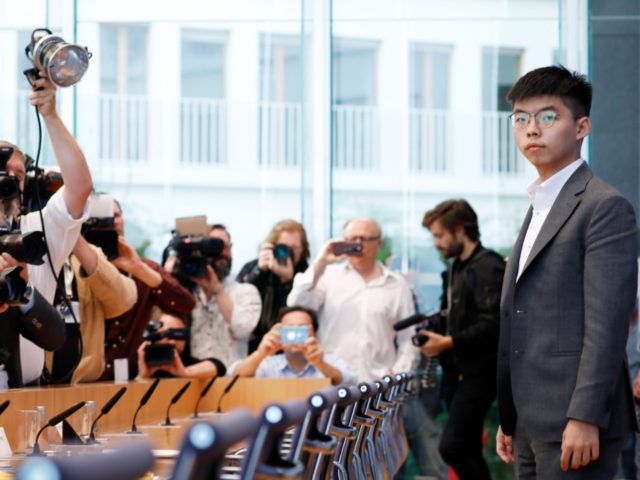Joshua Wong, head of one of the largest pro-democracy movements in Hong Kong, stormed an electoral council meeting Thursday night along with a crowd of protesters, forcing it to end early, as the government tries to keep him off the ballot.
Wong is the last of over 1,000 candidates applying to run in the upcoming district elections to hear if the government will allow him on the ballot. While he filed for a position to run for the South Horizons West seat in the Southern District Council three weeks ago, his vetting remains ongoing, and the official in charge of processing his filing to run, Dorothy Ma, abruptly took indefinite “sick leave” on Thursday.
The elections are scheduled to take place on November 24.
Wong, 23, rose to prominence as a teenager in the 2014 Umbrella Movement against growing Chinese Communist pressure on the Hong Kong government to suppress dissent. He is currently the secretary-general of the pro-democracy movement Demosisto and one of the most recognizable faces of the Hong Kong pro-democracy movement, though the movement insists on being a leaderless revolt against creeping authoritarianism.
Wong was in prison when the current ongoing protest movement erupted in June, serving a month-long sentence for his participation in the 2014 protests.
The meeting protesters interrupted on Thursday evening was billed as a briefing for approved candidates running in the upcoming elections. Had Wong’s candidacy been approved in time, he would have joined other candidates in receiving information on basic campaign rules and resources for those running for office. According to local media, authorities let Wong into the meeting as an “election agent” for an approved candidate who has yet to be identified.
As Barnabas Fung, the chair of the Electoral Affairs Commission, attempted to address the candidates, a crowd of protesters interrupted, chanting pro-democracy slogans including “five key demands, not one less.” The protest movement has issued five demands of the government before it ends the routine protests: an end to a proposed bill that would allow China to extradite individuals present in Hong Kong; freedom for political prisoners; an independent investigation into police brutality; direct election of all lawmakers; and an end to the government calling protesters “rioters.”
Hong Kong Chief Executive Carrie Lam ordered the full withdrawal of the extradition bill, then demanded protesters stop taking the streets, resulting in the coining of the “five key demands” slogan.
The protesters also demanded an end to the Hong Kong government having to approve all candidate for political office. The Hong Kong government, controlled by the Communist Party in Beijing, screens candidates for anti-China sentiment. Individuals labeled “separatists” are banned from running for office.
Wong has insisted he is not a “separatist” and believes Hong Kong belongs with China, but has called for a fully democratic China and the end of the communist regime. He has referred to dictator Xi Jinping as an “emperor.”
“I hope one day, not only Hong Kong but also mainland China people can enjoy human rights and freedom,” Wong said in September.
Videos from the candidate briefing show a chaotic scene in which the protesters drowned out the meeting, initially forcing it to pause and ultimately to end early. Wong attempted to demand the commission give him a clear answer on whether or not his name could appear on the ballot and, footage from Hong Kong broadcaster RTHK and newspaper Apple Daily shows, at one point attempted to jump over the council’s table to confront Fung directly.
According to the Asian outlet Coconuts, Wong had told reporters that he wished to ask Fung about the status of his candidate and if Ma’s “sick leave” meant that he would have to refile all his paperwork and start anew, less than a month before the election.
The government of Hong Kong issued a statement condemning Wong and the protesters on Friday.
“The [Electoral Affairs Commission] EAC strongly condemns the disruptive acts during the briefing session, resulting in the cancellation of briefing session,” the statement read. “[S]ome people disrupted the order during the session, shouted, threw objects at the speakers, and seriously disrupting the order of the event. The briefing had to be cancelled. The EAC expressed deep regret and strongly condemned the disruptive acts of those people.”
In a press conference Thursday, Wong accused the Hong Kong government of “trying to silence the voice of youth activism” by disappearing the official in charge of his candidacy.
“Within the past seven days, Ms. Ma didn’t contact me at all, reply to my letter, or make the decision to approve my candidacy or not,” noted, contending that she was facing “a huge burden and political pressure from Beijing, Hong Kong, and the international community.”
“Clearly [Ma] is under immense pressure from Beijing to disqualify me,” he added on Twitter. He also noted that officials have asked him repeatedly if he supports independence from China.
Wong has been arrested twice since his release in June. In August, police arrested him and another four prominent pro-democracy activists for alleged rioting. He was arrested again at the end of the month following his return from a brief trip to Taiwan to galvanize international support for the protests.
Hong Kong is currently governed under a policy known as “One Country, Two Systems.” The policy gives sovereignty over Hong Kong to Beijing under the condition that the Communist Party cannot impose its laws on the former British colony. China exercises control over Beijing through its lawmakers, a significant percentage of whom are chosen by special interest groups and only and a handful of which are directly elected by the people. The extradition law would have allowed China to imprison people present in Hong Kong for violating Chinese law, a clear breach of “One Country, Two Systems.”

COMMENTS
Please let us know if you're having issues with commenting.